- Home
- Anders de la Motte
Rites of Spring Page 15
Rites of Spring Read online
Page 15
Arne squeezed his eyes tight shut, swallowed hard several times. He’d come five metres, and he still had five metres to go. Trying to turn around and go back would be even more hazardous than carrying on.
All he had to do was take one step at a time. Calmly and cautiously.
He took a deep breath. One small step. Then another.
When he finally reached the other side he was so relieved that he had to go behind a tree and empty his bladder.
*
The noise frightened Arne at first, even though he didn’t want to admit it. A dull, rhythmic drumming that got louder and louder as he approached the stone circle. Between the tree trunks up ahead he could see a flickering glow, and he quickly switched off his torch. He plodded on through the darkness, but immediately lost the winding track and ended up among the brambles. The vicious thorns pierced his flesh through his shirt and trousers. He slowed down and eventually came to a stop; the brambles were too thick to allow him to proceed.
The drumming continued, accompanied now by chanting voices. The luminous hands on his watch showed five to twelve.
He had to see what the hell was going on, right now before it was all over. He fought his way onwards with blood trickling between his fingers until he reached a tree with low-growing branches that enabled him to pull himself free of the brambles. He kept on climbing until he could see the glade.
See what she had wanted him to see.
The spring sacrifice.
36
W
hen Thea reaches the stone bridge she see that someone is leaning over the balustrade – a short man in dark clothing, puffing away at a cigarette.
It’s Hubert Gordon. He straightens up, touches the peak of his cap.
‘Good afternoon,’ he says.
Emee, who is normally so reserved, wags her tail and rubs up against his legs like a cat. Thea has wiped her nose and mouth with some leaves. There wasn’t much blood, but enough for the feeling of disquiet to linger. Has Emee been up to no good in the deer enclosure?
Hubert tosses his cigarette into the moat, crouches down and scratches behind Emee’s ear.
‘Good girl,’ he murmurs. ‘Good girl.’
Thea doesn’t really know what to say. The behaviour of both man and dog has taken her by surprise.
‘Thanks for your help the other day,’ she manages eventually.
Hubert merely nods. He stands up, strokes Emee’s head.
‘She likes you,’ Thea says unnecessarily.
The comment evokes a wry smile. ‘Animals usually do.’
‘Don’t you have a dog of your own? Most people around here seem to.’
Hubert shakes his head. ‘We used to have them when I was little. Hunting dogs, outdoors in the kennels over by the stables. That was how my father wanted it. His dogs, not mine.’
Thea notices that he speaks in short sentences.
He produces a packet of cigarettes and offers it to her. She takes one, waits while he lights it and another for himself. She ought to go home really. Carry on reading the documents, find out what David and his friends saw that night. But this strange little man interests her.
The cigarettes he smokes are slender, with no filter. They remind her of the ones Margaux used to smoke. He turns towards the water. The smell of the marsh is unmistakable. Emee sits down between them, and they smoke in silence for a while.
‘What did you do before you came here?’ he asks.
‘I worked for Doctors Without Borders. At a field hospital in Idlib in Syria. We were bombed . . .’
She takes a deep drag, holds the smoke in her lungs. Why is she telling him this? She doesn’t even know him. And yet . . . The feeling is there again, the sense that she and this little man share something. The same kind of pain. The same kind of sorrow.
‘It was utter chaos,’ she goes on. ‘I lost colleagues, friends. I spent several weeks in hospital. I’m not fully recovered yet, to be honest.’ She falls silent. Her eyes are smarting. Maybe it’s the smoke, maybe not.
‘Your friend who’s sick – was she there?’ Hubert asks without turning his head.
‘Yes.’
He doesn’t ask any more questions; she is grateful for that. Instead he finishes his cigarette and tosses it into the moat, just as he did with the first one.
‘May I offer you a cup of coffee?’ he says.
*
The front door is small in comparison to the wing itself. Hubert’s old Land Rover is parked outside.
They go up the stone staircase and find themselves at the end of a long corridor on the first floor. To the right are two tall double doors equipped with a heavy steel bolt. There is a cross on one of the doors; this must be the chapel, which Dr Andersson mentioned. Straight ahead another door leads to the rest of the castle; it too is bolted.
Hubert guides her to the left. The ceilings are high, the floor made of huge, smooth slabs of stone. On the walls are gloomy paintings of stern men in wigs and uniforms, with the odd woman in a shiny dress, her face whitened with powder.
‘My ancestors,’ Hubert says, anticipating her question. ‘Eight generations of Gordons in chronological order.’
They pass several more closed doors until they reach one that is open. Thea is surprised to see a modern little kitchen.
‘Take a seat in the library.’ Hubert points towards the end of the corridor. ‘I’ll bring the coffee. You can let the dog off the lead if you like.’
Thea does as he suggests, and Emee runs off ahead of her, as if she already knows the way.
The room is large, it must be over a hundred square metres, with triple aspect windows. There are thick, valuable rugs on the floor, and the walls are lined with dark bookcases; you would need a ladder to reach the top shelves. The smell of cigars and old books makes Emee snuffle and sneeze before she gets down to the serious business of investigating the corners.
Thea goes over to the window facing onto the garden. She pushes the heavy velvet curtain aside and looks out. This must have been where Hubert was standing when she caught sight of him on the night of the storm.
She moves to another window on the short wall of the wing, with a view of the moat, the bridge and the forest. A skein of geese is flying high in the sky, and over to the right she can see the roof of the coach house.
Emee is still checking out the room, and has stopped by the drinks trolley. Up above her on the wall hangs a more modern portrait than the ones in the hallway. A hook-nosed, grim-faced elderly man in a suit is standing beside a beautiful, considerably younger woman with skin like alabaster. Between them is a boy in a sailor suit. He must be seven or eight years old, and the artist has done his best to tone down the scar on his upper lip. There is no mistaking the fact that the boy is Hubert Gordon, which means the adults must be his parents.
‘Mother and Father,’ Hubert confirms as he enters the room with a tray. ‘The last Count Gordon. The family dies out with me.’
He places the tray on a table between two wing-backed armchairs and gestures to her to take a seat as he pours the coffee.
‘No more Gordons at Bokelund,’ he continues. ‘Probably just as well . . .’
‘Why do you say that?’
He leans back in his chair. ‘Because the Gordons are terrible people.’
Thea raises her eyebrows.
‘Have you heard about the girls who haunt this place, Isabelle and Eleonor? How they died?’ Hubert’s tone is lighter, less tense.
‘One fell through the ice on her way to a secret tryst with her lover, and the other came off her horse,’ Thea says, remembering what David said during the TV interview.
Hubert shakes his head.
‘Isabelle drowned at the end of April 1753. At least that’s what it says in the parish records. The ice on the moat has never lasted beyond the end of March, not even in the worst of winters.’ He takes a sip of coffee. ‘And Eleonor was expecting a baby when she broke her neck in 1891. A pregnant woman riding out on a fox h
unt sounds a little strange. According to the rumours, her own father was the father of the child.’
‘You mean . . .’
‘I mean that both girls were actually murdered, probably by their fathers or someone doing their fathers’ bidding. One drowned, one beaten to death. As I said, the Gordons are terrible people. Generations of incest and marriage between cousins gives rise to certain defects, both on the inside and the outside.’
Thea doesn’t quite know how she’s expected to respond.
‘What a wonderful library,’ she says when the silence has gone on long enough.
‘That’s mostly thanks to my mother. She organised the collections when I was small. She loved books.’ He stares down into his cup.
‘Have you always lived at Bokelund?’
‘Mostly. I went to boarding school in England for a while – a family tradition. The Gordons are originally British.’
‘And the rest of the time you went to school in Tornaby?’
The question isn’t as innocent as she is trying to make it sound. Hubert is only a few years older than Elita Svart. His father owned Svartgården. Maybe he knew her?
To her disappointment, Hubert shakes his head.
‘I was educated here in the castle. The schoolroom is over in the east wing, and the governess lived in the room next door. That was Father’s decision. He didn’t want me mixing with the villagers.’
Thea tries to work out whether the last comment is a joke; she’s not sure.
‘You mentioned your sick friend . . .’ Hubert points to Emee, who has settled down on the floor beside them. ‘The one with the dog. What’s her name?’
‘Margaux. She’s French.’
‘From Paris?’ His face lights up.
‘Yes, actually. Have you been there?’
‘Once, when I was very young. My aunt lived there, and my mother and I went to visit her. I remember it as a fantastic place. I dreamed of going back there when I was older, but Father and my aunt hated each other, and after Mother died he wouldn’t let me go anywhere. And since I grew up, it just hasn’t happened. Maybe I’m afraid the city won’t live up to my expectations, that it won’t be as perfect as it is in my dreams. Things rarely are.’
He takes another sip of coffee, seems surprised by how talkative he is, like so many people who meet Thea.
‘Have you known each other long, you and Margaux?’ he asks, turning the focus of the conversation back to her.
‘Yes.’ Thoughts she usually manages to suppress are threatening to come pouring out. She wants to tell him that Margaux was her best friend. Her only friend. That she meant much more than that. Instead she is a coward, hiding behind her coffee cup.
Hubert gazes at her. His eyes are soft, full of sorrow.
‘I’ve also lost someone who was close to me,’ he says. ‘It’s a long time ago now, but the pain never really goes away. It leaves an empty space inside you.’ He glances up at the portrait.
Neither of them says anything for a long time, but as before, the silence isn’t in the least uncomfortable.
‘What about you and David? How long have you been together?’
‘About five years, on and off.’
‘On and off?’
‘We dated whenever I was home from my travels – nothing too serious. But after the bombing he was there for me. He flew down to the hospital in Cyprus, took care of everything. It was the same when I came back here. I’ve been suffering from the after-effects for almost a year, but David’s supported me, helped me to get back on my feet.’
‘Was that why you married him?’
The question surprises her. So does the answer.
‘Yes.’
She hasn’t shared that thought with anyone except Margaux, but when you get behind his slightly morose façade, Hubert is very easy to talk to. It’s as if he has the same effect on her as she has on other people. The admission makes her feel strangely relieved. Hubert doesn’t say a word; he merely nods.
They sit in silence again. The feeling of affinity between them has grown even stronger.
Thea looks at her watch. David must be wondering where she is. Whether she’s found Emee. Maybe he’s worried? She stands up, even though she would rather stay.
‘I’m afraid I have to go. Thanks for the coffee.’
Hubert accompanies her into the corridor.
‘Wait a minute,’ he says when they reach the top of the stairs. He disappears through one of the closed doors and returns after a few seconds. Thea catches a glimpse of a narrow bed and a TV, and guesses that it’s his bedroom.
‘I think you might enjoy this.’
He hands her a well-thumbed book: Selected Poems by Stanley Kunitz.
‘It’s helped me sometimes, when things have been difficult. Maybe it will help you.’
‘Thank you.’ The gesture is so kind that a warm glow spreads through her body.
‘You’re welcome. I hope you’ll come and see me again.’
‘I’d love to.’
They go downstairs and she hears him close the front door behind her. And double lock it.
37
Walpurgis Night 1986
I have chosen them with care, my little tadpoles. Chosen the children whose parents snigger at me behind my back and pull faces when they talk about me, as if my name has a nasty taste.
Those children will witness the death of Elita Svart.
A
rne pressed the binoculars to his eyes so hard that he couldn’t see properly. A big fire is burning over in the glade, casting long, flickering shadows over the stones. Elita and the children were standing in the centre of the circle, right next to the flat sacrificial stone. The whole thing looked exactly like the Polaroid: Elita’s white dress, the antlers, the silk ribbons, the masked children. The full moon riding high above them intensified the sense of unreality.
His ghetto blaster was on one of the other stones. The recorded sound of drumming reverberated around the glade, along with voices chanting something in English that Arne didn’t understand at first.
Elita gestured to the children, said something. They formed a circle around her, fully extending the ribbons attached to her wrists. Arne adjusted the focus, managed to sharpen the image.
Elita began to move, taking slow steps in time with the drums. She was barefoot on the wet grass; Arne thought he could see the moisture gleaming on her shins.
The chanting continued, and by now he had heard it often enough to be able to make out the words.
‘Hoof and horn, hoof and horn. All that dies shall be reborn.
‘Corn and grain, corn and grain. All that falls shall rise again.’
The rhyme was repeated over and over again, each time a little faster than the one before. Elita’s feet were moving faster too. She swung her arms, spun around on the spot, taking the children with her.
‘Hoof and horn, hoof and horn. All that dies shall be reborn.’
Elita’s movements became more frantic. She threw her head back and raised the antlers high in the air, drawing the children closer.
The circle spun faster and faster, closer and closer. Arne swallowed, felt himself grow hard.
‘Corn and grain, corn and grain. All that falls shall rise again.’
The children pulled on the ribbons, locked Elita in the centre of the circle with her arms outstretched.
The tempo of the drums continued to increase. The circle was spinning so fast now that Arne could barely make out the children. But he didn’t care about them; Elita was all that mattered. Her eyes were closed, her chest shining with sweat above the neckline of her dress. She looked as if she was in a trance.
Arne’s mouth was as dry as dust, his face was burning, his trousers straining at the crotch. He reached for the zip with his free hand, but something made him pause. At first it was only a barely perceptible vibration in the darkness, then a pulsating beat that clashed with the rhythm of the drums.
He lowered the binoculars and twist
ed around, almost losing his balance in the process.
The beat grew louder, turning the hairs on the back of his neck into tiny, needle-sharp ice crystals. He’d heard it before, many times. The sound of hooves, of branches and twigs breaking. The sound from his nightmare, a rider approaching.
The hoof beats came closer and closer, thundering inside Arne’s chest, his head, his crotch. His cock shrank to the size of a pathetic little worm.
Horse and rider burst through the greenery directly below him. He caught a glimpse of a huge black horse that was something else at the same time, something ancient that might not even be a horse. And the rider . . .
Arne screamed, but exactly as in his dream, not a sound came out.
He closed his eyes, heard the Green Man and his steed crash through the undergrowth beneath him.
The smell of stagnant water overwhelmed him. Rotting wood and dead leaves, the stench of things that crept and crawled and transformed what had recently been alive into earth and mould. Transformed a grown man into a little child.
He lost his balance and fell backwards out of the tree. Hung in the air just long enough to think that the landing would be painful.
He could hear terrified screams from the glade, almost drowned out by the bellowing of an animal.
The sound was cut off abruptly as Arne hit the ground, letting the night into his head.
38
‘I’ve had a look at Hubert’s book. The poems are beautiful, melancholy in a way that I really like. They express a kind of longing, both for what has been and what never was.
‘Hubert has written inside the cover that the strongest love is unrequited love. I’ve searched for the quotation in the book, but I can’t find it. Anyway, I understand exactly what he means.’
D
avid is playing the good husband. Preparing meals, asking about her work. In spite of his efforts, Thea can tell that his thoughts are elsewhere. He’s irritable, flares up at the least thing. She can’t help recalling his outburst the other day when he attacked the builder; he still hasn’t said anything about the incident. He gets phone calls until late into the evening, and he doesn’t protest when she says she’s tired and closes the bedroom door so that she can concentrate on the file the archivist gave her.

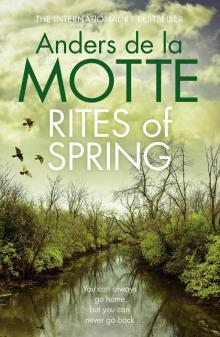 Rites of Spring
Rites of Spring Game: A Thriller
Game: A Thriller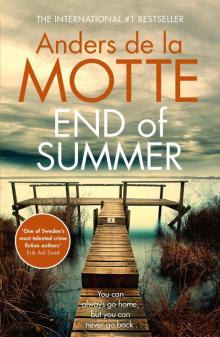 End of Summer
End of Summer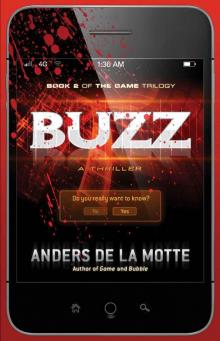 Buzz: A Thriller
Buzz: A Thriller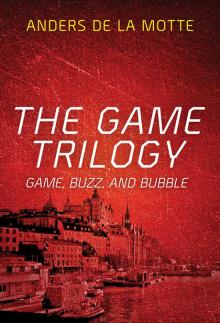 The Game Trilogy
The Game Trilogy Bubble: A Thriller
Bubble: A Thriller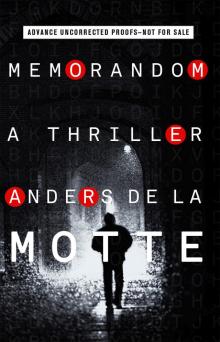 MemoRandom
MemoRandom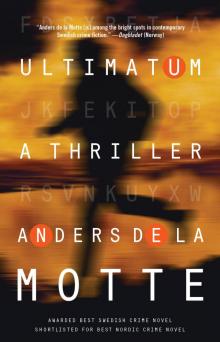 Ultimatum
Ultimatum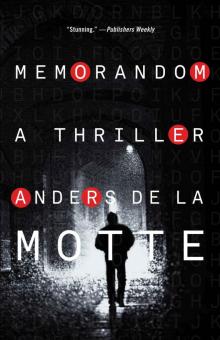 MemoRandom: A Thriller
MemoRandom: A Thriller